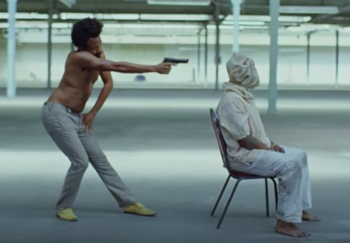This is America
Don’t catch you slippin up
Look at how I’m livin now
Police be trippin now
Yeah, This Is America
Guns in my area
I got the strap
I gotta carry’ em
#ChildishGambino #DonaldGlover
RELATED: Five Things To Know About “This Is America” Video
RELATED: Interview With Director Hiro Murai
THE NEW YORKER: The Glovers were Jehovah’s Witnesses. They believed that Satan controls life on earth, that only a hundred and forty-four thousand anointed Christians will be saved to Heaven with Jesus, and that we are living out the last days before Armageddon. Stephen Glover said, “We were wised up early to not celebrating our birthdays and that there was no Santa Claus and no magic. Our mom made us watch ‘Mississippi Burning’ when I was six, and she always warned me about wearing saggy pants and said, ‘If someone sucks your penis, come tell me.’ ” Glover said, “I know Mom was doing all that to protect us, but it gave me nightmares. I wouldn’t go into bathrooms alone or eat anything except turkey.”
Beverly Glover forbade all television but PBS—animal shows and slavery documentaries. Donald, Sr., sometimes let the kids watch Bugs Bunny cartoons and Bill Murray movies. Glover would secretly turn the television on with the sound low and tape episodes of “The Simpsons” on his Talkboy recorder so that he and Stephen could listen to them later: archeologists reconstructing the popular culture of their own time.
Glover announced early on that he wanted to attend N.Y.U.’s Tisch School of the Arts and then write for “The Simpsons.” That seemed unattainable, but so did most of his desires. When Nintendo 64  came out, in 1996, his mother declared it too expensive. Stephen Glover told me, “I said, ‘Oh, well.’ But Donald heard on Radio Disney that they were giving a Nintendo 64 away to the ninetieth caller every day for a week. He listened all week and kept calling in until he gauged the perfect time, and one day he ran upstairs and said, ‘I won it!’ He’s always been able to will what he wants.”
came out, in 1996, his mother declared it too expensive. Stephen Glover told me, “I said, ‘Oh, well.’ But Donald heard on Radio Disney that they were giving a Nintendo 64 away to the ninetieth caller every day for a week. He listened all week and kept calling in until he gauged the perfect time, and one day he ran upstairs and said, ‘I won it!’ He’s always been able to will what he wants.”
In Glover’s living room, his son, Legend, ran in clutching a plastic giraffe. Glover hugged him and fell backward. “Shoe, Daddy, there!” Legend cried, pointing at his own shoe. “That’s right,” his father said, holding him aloft.
As Legend bustled over to show me the giraffe, Glover said that he thinks of reality as a program and his talent as hacking the code: “I learn fast—I figured out the algorithm.” Grasping the machine’s logic had risks. “When people become depressed and kill themselves, it’s because all they see is the algorithm, the loop,” he said. But it was also exhilarating. When he was ten, he said, “I realized, if I want to be good at P.E., I have to be good at basketball. So I went home and shot baskets in our driveway for six hours, until my mother called me in. The next day, I was good enough that you wouldn’t notice I was bad. And I realized my superpower.” During a lunch break on set one day, in the gym of a Baptist church, I had watched Glover play 21 against five crew members. He made three long jumpers, then began charging the lane to launch Steph Curry-style runners—stylish, ineffective forays facilitated by the crew’s reluctance to play tough D. “It sounds like I’m sucking my own dick—‘Oh, he thinks he’s great at everything,’ ” he said now, leaning forward. “But what if you had that power?” MORE
